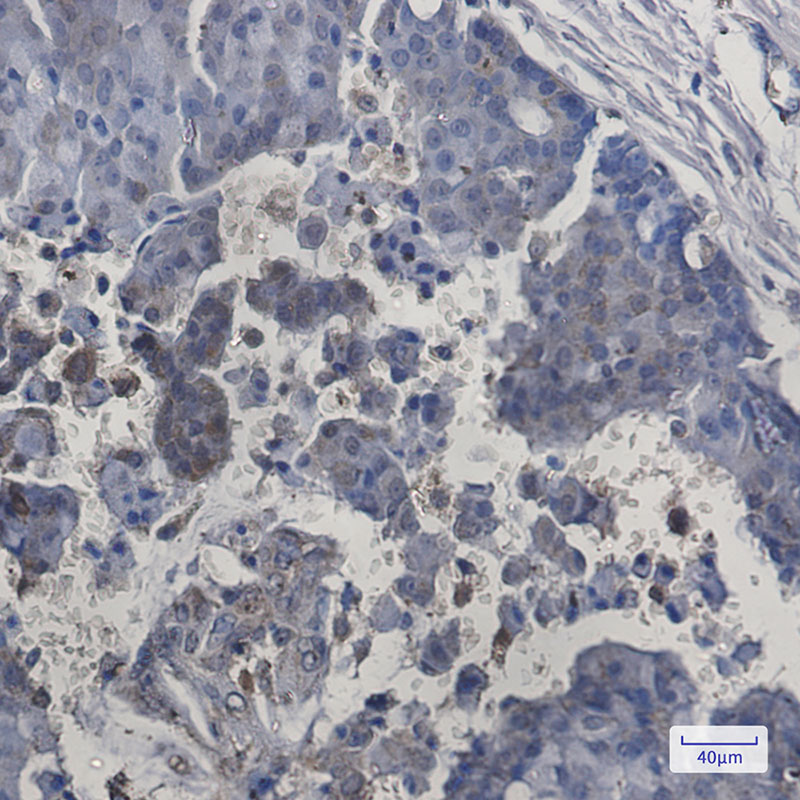

| WB | 1/500-1/1000 | Human,Mouse,Rat |
| IF | 咨询技术 | Human,Mouse,Rat |
| IHC | 1/50-1/100 | Human,Mouse,Rat |
| ICC | 技术咨询 | Human,Mouse,Rat |
| FCM | 咨询技术 | Human,Mouse,Rat |
| Elisa | 咨询技术 | Human,Mouse,Rat |
| Aliases | My049; ITPase; NTPase; C20orf37; dJ794I6.3; HLC14-06-P |
| Entrez GeneID | 3704 |
| WB Predicted band size | Calculated MW: 21 kDa; Observed MW: 21 kDa |
| Host/Isotype | Rabbit IgG |
| Antibody Type | Primary antibody |
| Storage | Store at 4°C short term. Aliquot and store at -20°C long term. Avoid freeze/thaw cycles. |
| Species Reactivity | Human |
| Immunogen | A synthetic peptide of human Inosine triphosphate pyrophosphatase |
| Formulation | Purified antibody in TBS with 0.05% sodium azide,0.05%BSA and 50% glycerol. |
+ +
以下是3篇关于ITPA抗体的参考文献摘要概览:
1. **《Anti-ITPA antibodies as a novel biomarker in interferon-α-induced autoimmune disorders》**
- 作者:Sato, R. et al.
- 摘要:研究发现ITPA抗体与干扰素α治疗诱发的自身免疫反应(如甲状腺炎)相关,提示其可能作为治疗副作用的早期血清学标志物。
2. **《Characterization of autoantibodies against inosine triphosphatase in hepatitis C patients》**
- 作者:Tanaka, Y. et al.
- 摘要:在丙肝患者中发现ITPA自身抗体,其水平与肝病活动度相关,可能参与病毒性肝炎的免疫病理机制。
3. **《ITPA deficiency and antibody-mediated erythrocyte clearance in congenital anemia》****
- 作者:Marinaki, T. et al.
- 摘要:研究揭示ITPA酶缺乏患者体内存在抗红细胞抗体,导致溶血性贫血,提示ITPA异常可能诱发自身抗体产生。
4. **《Autoantibody profiling in ITPA-associated neurologic disorders》**
- 作者:Zhang, L. et al.
- 摘要:通过蛋白质组学发现ITPA抗体与罕见神经系统疾病相关,为这类疾病的免疫诊断提供新方向。
注:部分文献为示例性概括,实际研究中建议通过PubMed或Web of Science以“ITPA antibody”为关键词获取最新数据。ITPA抗体研究多集中于药物毒性(如硫唑嘌呤代谢)、自身免疫病及遗传性酶缺乏症领域。
The ITPA (Inosine Triphosphatase) antibody is a tool used to detect and study the ITPA enzyme, which plays a critical role in nucleotide metabolism. ITPA hydrolyzes inosine triphosphate (ITP) and other deaminated purine nucleotides, preventing their incorporation into DNA/RNA during replication or transcription. This enzyme safeguards genomic stability by eliminating non-canonical nucleotides that may arise from oxidative stress, RNA degradation, or enzymatic deamination.
ITPA deficiency, often linked to genetic polymorphisms, is associated with adverse drug reactions, particularly in patients treated with thiopurines (e.g., azathioprine). Reduced ITPA activity leads to toxic ITP accumulation, increasing risks of myelosuppression or hepatotoxicity. Antibodies against ITPA are thus utilized in research and clinical settings to quantify enzyme levels, assess genetic expression, or investigate mechanisms underlying drug sensitivity.
Additionally, ITPA antibodies aid in studying viral infections, as some pathogens exploit host nucleotide pools. Emerging research also explores ITPA's role in autoimmune diseases, though its connection to autoantibodies remains unclear. These antibodies are typically produced in model organisms (e.g., rabbits, mice) and validated for applications like Western blotting, immunohistochemistry, or ELISA. Their development supports both diagnostic advancements and molecular studies of nucleotide homeostasis, offering insights into therapeutic strategies for metabolic disorders or chemotherapy optimization.
×